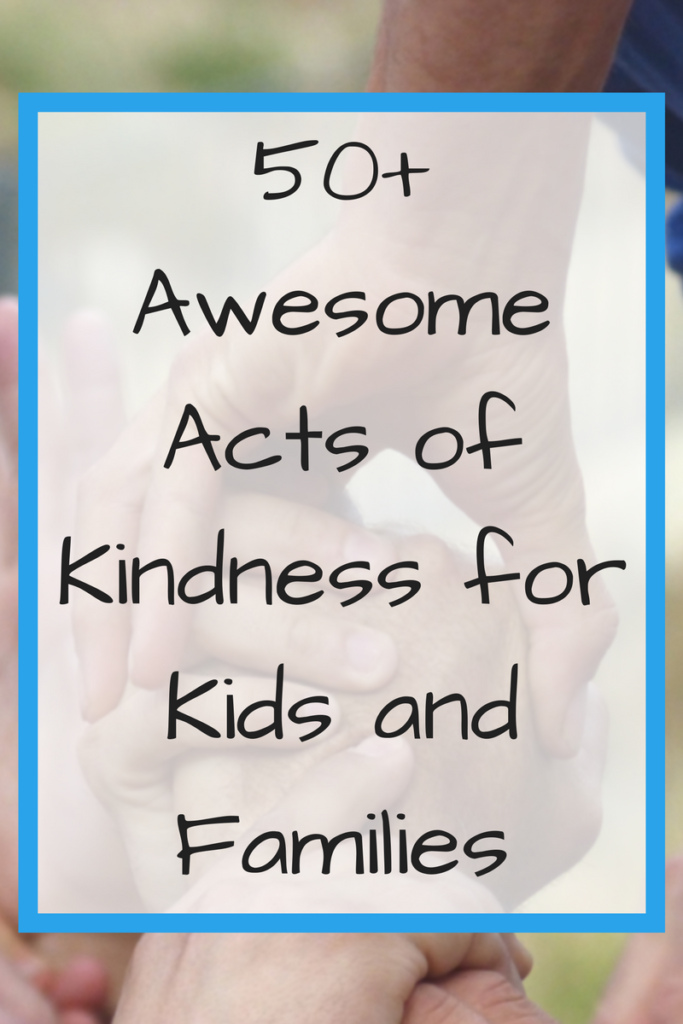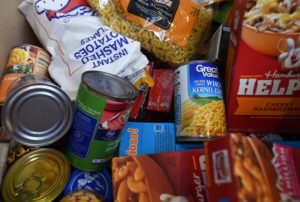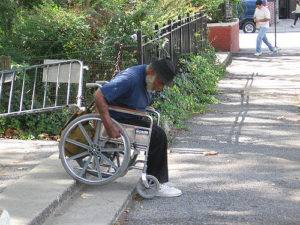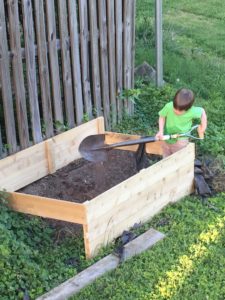Want to teach your kids kindness but don’t know where to start? From learning how to listen to fighting poverty, here are more than 50 acts of kindness with real, concrete impacts for kids and families to do together.

“Was that a kind thing to do?” I asked my four-year-old right after he snatched a toy away from his younger brother.
He looked down and said, “No.”
“What would be a better choice?” I said, hoping he can figure it out on his own.
Teaching kids what kindness is and how to demonstrate it in everyday life isn’t easy. Even adults struggle to listen to people without judgment or jumping in with their own opinions.
It gets even harder when you think of kindness beyond being “nice.” Compassion and respect for all people involves examining a number of our society’s toxic systems and working to change them.
It can be overwhelming.
To make it a little easier, I’ve assembled a list of 50 acts of kindness for you and your kids to explore together. I’ve broken them into five categories, from building a kind mindset to challenging inequality. Many of these draw on research from Harvard University on encouraging kindness in children. You can get more information on almost every activity by clicking through on the link.
To get five days worth of in-depth descriptions of some of the most high-impact activities right to your email, be sure to subscribe to our Family Kindness Challenge!
Build everyday kindness
These acts of kindness will build emotional intelligence skills that kids and adults alike can use to show kindness to our family members, friends, and even strangers.

- Demonstrate, teach, and practice active listening skills with your kids.
- Read stories about friends who disagree but love each other anyway, like Duck and Goose, Elephant and Piggie, or Bella and Bean.
- Discuss ways to respectfully express emotions, especially those that can be destructive to others like anger and jealousy.
- Watch this great video from sociologist Brene Brown together on how empathy is different from sympathy.
- Talk about an ethical issue or role-play an ethical scenario, such as how to respond to someone saying something racist or sexist.
- Simply tell your kids how much you value kindness! In a survey of 10,000 kids across the country, 80% of kids thought their parents valued academic achievement above kindness.
- Create a gratitude list with your kids where you all write down what you’re grateful for.
- Ask your kids at dinner or bedtime about a kind thing they did that day.
- Discuss a time you were unkind, how you felt, and what you did to fix it. Kids deeply appreciate when their parents show honesty and vulnerability. Doing this will give you more credibility in the long run.
- Write a thank you note with your kids to someone who did something kind for you.
- When you’re reading a book, talk about how characters feel and why they may feel that way. While this is easy with picture books, you may need to read a chapter book at the same time as your older kid to have this sort of conversation.
- When you tell your children why they can’t do something, explain it in the context of how it affects others. For example, if you are asking them not to interrupt their sibling, explain how it makes the brother or sister feel like the child doesn’t respect what he or she has to say.
- Look into organizing a “Mix It Up” event at your school, where kids purposely change who they sit with at lunch.
Carry Out Concrete Acts of Kindness to Help People in Poverty
Economic inequality is one of the biggest sources of suffering in the United States and the world. Helping people in poverty is a way that children can see real effects of their actions.

- Organize a funding or food drive for a food bank.
- Put together and distribute kits for people living on the street.
- “Buy” supplies for people in developing countries from Oxfam or Heifer International.
- Organize a winter clothes or sock drive for a homeless shelter. (Check to see what they need first.)
- Reach out to a local refugee placement agency to see what they need. (Ours asked for school supplies for kids who had just arrived in the country.)
- Find out from your church or PTA if there’s a family struggling to get by. Buy them grocery store gift cards and give them anonymously through the church or PTA.
- Donate to a local diaper bank. (Low-income families can’t use food stamps to buy diapers.)
- If you have a store near you that does layaway, pay off part of a family’s bill.
- Find out if your school has a food pantry for students who need snacks or food to take home. Offer to help restock it.
Change hearts and minds about unjust systems and attitudes.
Being truly kind requires transforming systems that reinforce inequality. Unfortunately, systems like racism and sexism deeply influence our own thinking even when we don’t want them to. To make real change, we have to examine our own perspectives and actively work to make them less prejudiced.

Photo courtesy of Carlos Martinez, CC 2.0, https://www.flickr.com/photos/kumanday/276903089
- Discuss privilege with your kids.
- Spend a day noticing the places that would be difficult or impossible to get to if you were in a wheelchair, including stairs without elevators, steep ramps, and non-accessible bathrooms. Disabled people’s needs are often ignored because able-bodied people just don’t think about them.
- Read a book about someone different from you and your children.
- Talk about the importance of consent in showing physical affection, both giving and receiving.
- Have the dad or granddad in the family involve them in cooking or cleaning. Daughters who see their dads doing household chores are more likely to have higher career aspirations in life. I bet both genders are less likely to grow up to be sexist too.
- Read a book about how marginalized people have worked to overcome oppression. We like Sit-In: How Four Friends Stood Up by Sitting Down and Little Melba and her Big Trombone. Be sure to mention that this work isn’t done yet.
- Sign up for a class on talking to kids about racial injustice, like those offered by Raising an Advocate and Safety Pin Box Kids.
- Read a book involving female characters who break stereotypes.
- Work together to write a description or draw a picture of an ideal world. Discuss what some of the barriers are to achieving it and how your family can work together to lower them.
- Explore a world calendar of religious holidays together. Use that as an opportunity to talk about different types of religions and their celebrations.
Acts of Kindness Towards the Environment and Everyone Who Lives in It
Climate change and other environmental issues often reinforce existing inequalities, hurting marginalized people the most. Helping children think about how their everyday actions affect people around the world can widen their point of view. Taking actions that minimize your greenhouse gas emissions can provide a concrete way for kids to feel like they’re making a difference. There are also a few activities on here that can help kids (especially little ones) think about how to show kindness to animals.

- Try composting to reduce food waste.
- Walk or bike to a nearby location that you would usually drive to.
- Make homemade bird feeders.
- Go on a walk and pick up every piece of litter you see.
- Read about how clean water affects people all over the world.
- Create habitat for animals by planting native wildflowers or bushes.
- Start seeds with your kids for a vegetable garden. Gardening improves the soil and guarantees your food is grown ethically. For an extra dose of kindness, plant a row to donate to a local food bank.
- Cook a vegetarian meal together, which typically has a much lower carbon footprint than meat. You can try Meatless Mondays (or even more!), where you go vegetarian for one day a week.
- Take the bus or train to a location you would usually drive.
- Visit a farmers’ market and talk to the farmers about how they grow their food.
Engage in Politics and Activism
Kindness extends beyond our individual lives. To treat all people with respect, we need to have policies that reflect those values. Teaching your kids about policies and how to change them – including but not limited to voting – will set them up for a lifetime of civic engagement.
- Use a newspaper article about war or poverty in a different country to start a conversation about what it would be like to live there. With older kids, use that conversation as a jumping-off point to discuss the policies that affect people in that country.
- Watch this video together about the Radical Brownies (now the Radical Monarchs), a youth-led group for girls of color focused on social justice, community activism, and embracing all aspects of their identities.
- Make a sign about an issue that your kids care about – from Black Lives Matter to trains – and hang it in your window.
- Tell your kids about a policy issue you are passionate about and why. Then have them share what they are passionate about. If they don’t have anything, explore their interests and how they could be affected by different policies.
- Research a political topic your kids are interested in – wildlife, education, clean water – and find out if there is a relevant bill in Congress addressing it. Call or write to your representatives with your kid.
- Have your kids think about what they would do if they were mayor of your city / town / county for a day. Email your local representatives with their ideas. (Many cities actually have a “mayor for a day” contests!)
- Find out what your school’s policy is on lunch debt. If it has a policy to throw away children’s lunches who don’t have enough on their cards, considering writing to the school board with your child to ask them to change it.
- Read some of the best books for kids about political activism.
- Take your kids to a political rally for a cause you care about: climate change, a LGBT pride parade, or another topic.
Teaching kindness to our kids is never just one single conversation. Instead, it’s a series of conversations and actions that we have over and over again. These ideas are just a jumping-off point for you to explore over your family’s lifetime journey.
If you want to get in-depth descriptions of five days worth of kindness-building activities, be sure to subscribe to our Family Kindness Challenge!
Oh what a lovely list of ideas! I think it’s so important to teach our children to be kind (it’s one of the core principles of my blog) – as parents, we’re in such a great position to make the world a better place by raising kids with the heart and passion to make it so! I’m definitely bookmarking this!
And someone else really loved this post too because they added it to the BlogCrush linky for some extra exposure! You can grab the code for your “I’ve been featured” blog badge from my site if you’d like to display it #blogcrush
Thanks so much for checking it out and letting me know!
Hi Shannon, I have to tell you how much I love this post! Our family rule is very simple: Be kind. It covers everything. It doesn’t always work, but it is our foundation. Thank you for this very wonderful post! #blogcrush xoxo
Just today after play in a park, a mother whose children were also playing in the park complimented me on how nice my daughters are. It felt so good. The practices in this post are great! We’re planning to go pack meals as volunteer work soon. I really don’t take credit for my girls being nice; I think I got lucky! But I’d like to step up and more consciously cultivate kindness with these suggestions. Thank you ~~~